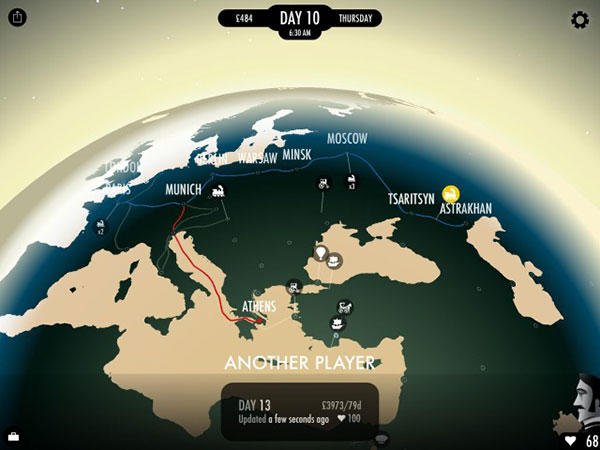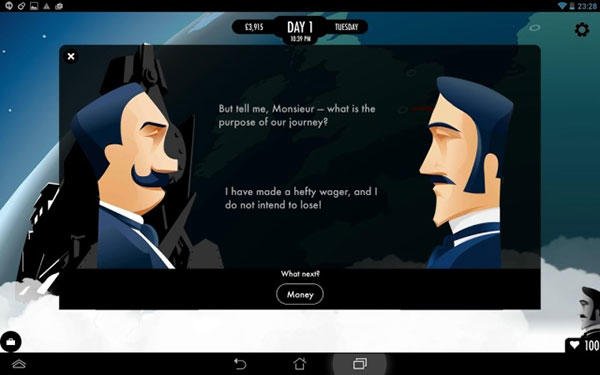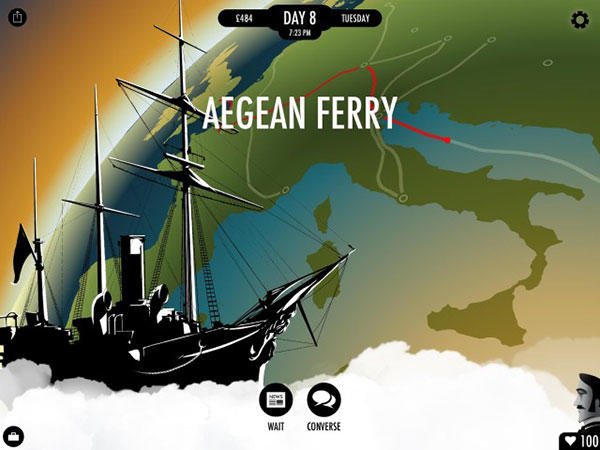The gaming review community at large was strangely enamored with the concept of 80 Days, an iOS game based on Jules Verne tale, Around the World in Eighty Days the round-the-world race adventure of Phileas Fogg and his faithful manservant Jean Passepartout. With organizations like IGN, Time magazine, New Yorker, Metacritic and even the iTunes App store itself giving the game absurdly high marks, I had to wade in and see what all the noise was about.
This is no Angry Birds clone here, you won’t be cutting any ropes here. Starting in London, in 80 Days, you play as Fogg’s butler Passeparout, and your job is to help the enigmatic Fogg work his way around the globe in less than eighty days. The game is set in a bizarre steampunk parallel timeline in 1873, where some of your methods of travel will include airships, railway trains that can submerge through bodies of water, camels, automatons: generally anything that can carry two people from point A to point B, you and Fogg will attempt to use them to get around the world before the eighty day deadline.

The game is more about managing resources and paying attention to the story as it unfolds before you, and let me tell you, there’s an absurd amount of story here. Having done one full playthrough of 80 Days and failing miserably at a bleak 97 days, I only visited 17 of the almost 200 available cities you can take to get back to London. Each city has its own series of events around it: will you be called upon to help solve a murder? Will Fogg volunteer you to fistfight a professional boxer to get some much needed traveling money? Will a mysterious dwarf from the Artificer guild fall head-over-heels in love with you, with her giving you some helpful technology?
Not only are each of these encounters unique, but each one has multiple dialogue options that can change the interaction dramatically. Much like real life, there’s no way to tell what your choices will bring about. Many other story driven games give you some kind of direction as to what your choice will lead to: maybe a font in red will lead to a hostile, aggressive tone or outcome. 80 Days? You can be as sweet as a piece of pie and then get punched in the face because the person you’re talking with doesn’t care for foreigners. The only context clues you’ll get are from the very well written exposition that fills up most of the “game”, but otherwise, you’re generally guessing a lot of the time as to how your decisions will play out. While more realistic, I did get the feeling like I didn’t have a whole lot of control on what was happening.

The delicate balancing act of weighing your available money with how fast you can bribe people to depart east more quickly is the other half of 80 Days. You have a limited amount of funds from the start of the game, and every choice in the game seems to deplete your cash reserves. Are you staying in a hotel and keeping Fogg’s health and mood up? Or are you staying with the bums in the alley next door for free? Who knows, you might share a bum fire with an out-of-work train engineer who can tell you about a shortcut to Vladivostok from Berlin! You can buy a katana in a store in Japan which will sell for a pretty penny in San Francisco, but maybe bribing the captain of the airship to move up the departure date two days to Washington would be a better move? Unless, of course, the airship has maintenance problems because you pushed the captain too hard to get there more quickly?
I wasn’t particularly enjoying myself to start off, wondering just what in the hell these reviewers were talking about. The game doesn’t exactly tell you what you’re doing: you simply show up with a global map, you’re in London and a pronouncement by Fogg to circle the globe in 80 days! I spent a lot of my first playthrough figuring out mechanics and the way of the world. For instance, I didn’t realize that when I spoke to the conductor to see if we could push shove off to Paris a day earlier that the money I was spending was in fact a bribe on top of what the ticket cost. Only after I moved through two cities and burned through half of my money did I realize what was going on. When I went to the market, I had the option to buy a tin of crackers for the bizarre price of 2L/100d which was good for “poor, earnest and prim types”. What? What in the hell does that mean?

However, as the days ticked by, I started to get more invested in 80 Days. I had spent too much money in Berlin and didn’t have enough for an expedited train ticket to the next city in line, so I was forced to shine shoes and run errands for folks at the hotel to earn enough money for the ticket. However, by the time it was time to leave, I’d spent so much money on the hotel waiting on the departure that I didn’t have enough for a regular ticket! It would take too long to wait at the bank to wire me some more funds from Fogg’s account, so I was forced down an alternate route in a desperate effort to keep moving forward instead of languishing in Berlin for a few more days.
Replayability! Given the way 80 Days game seeds go, you’re guaranteed never to play the same game twice. With the amount of writing that has gone into 80 Days, there is a hell of a lot to see and experience over the course of your adventure. I lost my race to get around the world in 80 days miserably, but having learned the mechanics a bit better, I knew I could improve my standing next time.
In a world where everything is trying to be the next big Call of Duty or Grand Theft Auto, for the developers to create such a beautiful, story driven, “choose your own adventure” style game after a Jules Verne novel is a brave one. 80 Days will not appeal to the general Angry Birds/Minecraft public, but if you can get into it, there’s a lot of “amazing” here that will keep you pecking away and biting your lip as you look at the game map, trying to figure out the best way to continue progressing. It definitely made me change my mind about my initial negative impressions; if you have a chance and don’t mind a whole lot of reading in your games, 80 Days is definitely worth picking up.

Stephen "Shanghai Six" Machuga is a writer for Front Towards Gamer.










